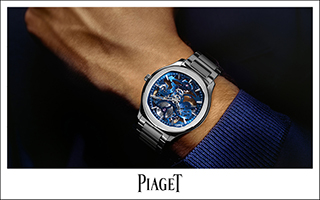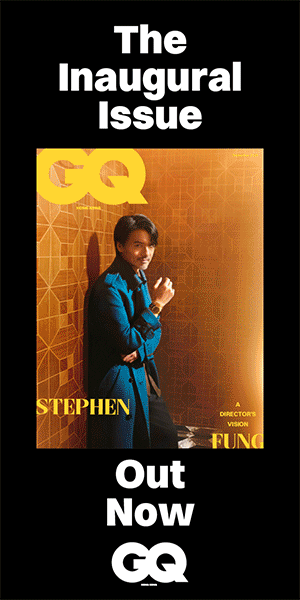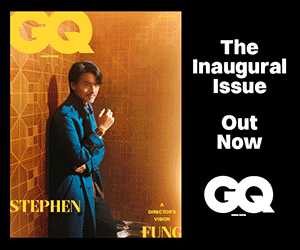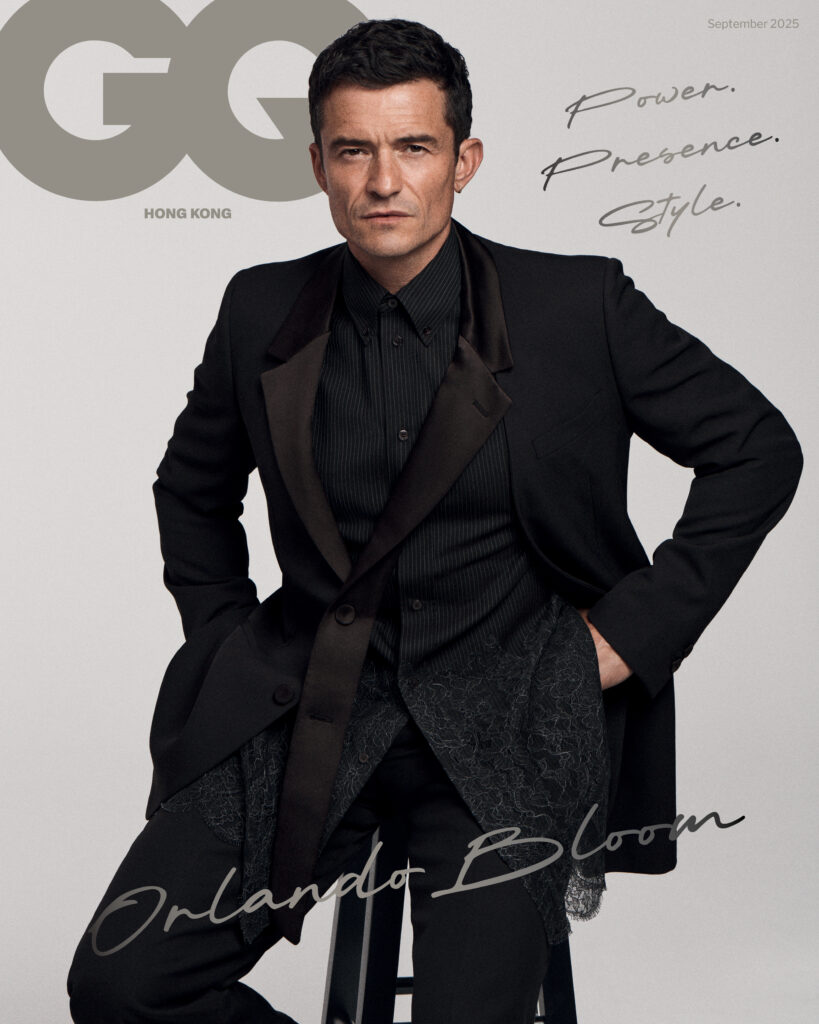“I’m not that easy to tame. You should see me under these lights, all my tears turn into ice.”
These are the lyrics Rosé sings in BLACKPINK’s latest single Jump, lines that carry an unmistakable streak of defiance. Indeed, Rosé has a soul that refuses to compromise. If you’ve ever caught sight of her under the spotlight, her vitality, blazing like fire, paired with that unmistakable voice that cuts through the noise, is unforgettable. On stage, her tears may appear frozen in the glare of the limelight, yet in her debut solo album Rosie, she reveals a truer side—where brilliance intertwines with vulnerability and resilience, just like every one of us.
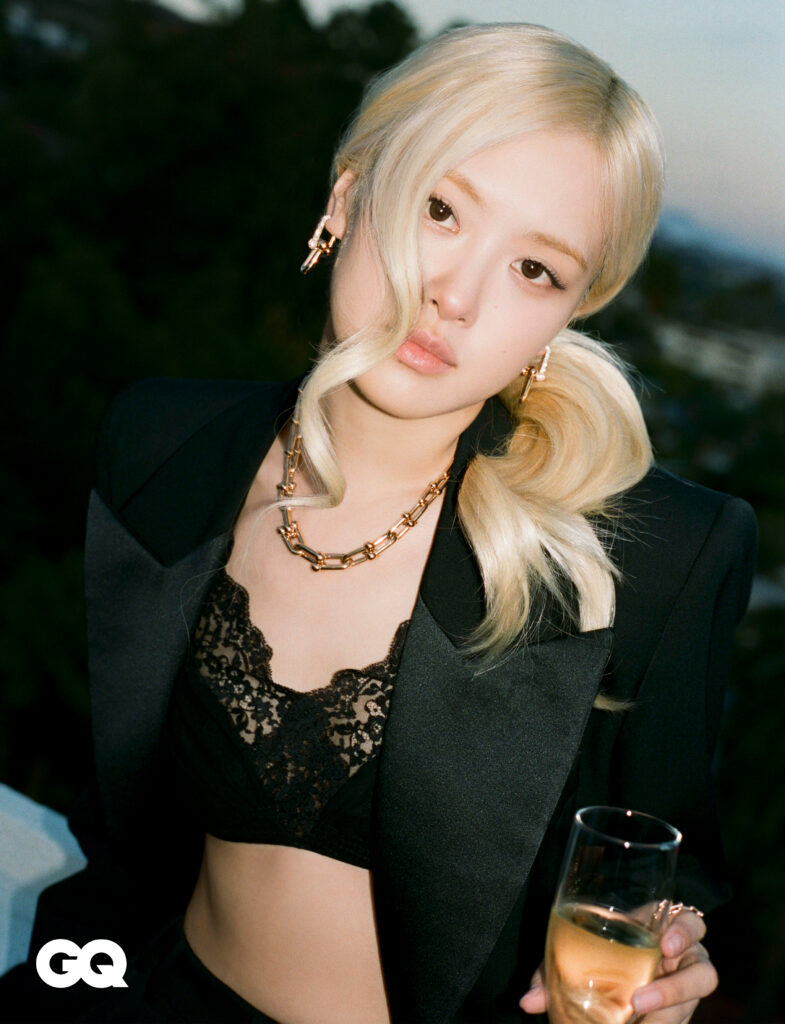
Our interview with Rosé was scheduled for 3:30 a.m. Hong Kong time. As the city slept, I played Rosie on repeat, immersing myself in the stories she tells through her music, preparing for a conversation with the soul behind the superstar. Rosie is like a private diary, each track unraveling tales of loss, heartbreak, anger, and longing—the trials of one’s twenties, almost rites of passage for youth. Through her handwritten lyrics, Rosé takes us back to moments where sweetness and bitterness entwine: the silent ache of letting go, the blaze of betrayal, and the fleeting flicker of rekindled love. The reason these songs resonate so deeply? Because who hasn’t been caught in a love we know is Toxic Till The End, yet still unable to leave? We’ve all lived through valleys like that, and through this record, Rosé whispers: I’ve been there too.
A sharp notification tone breaks the silence. Someone is joining the call: R.
Rosé appears on my screen, sitting cross-legged on the floor of her Los Angeles living room, wearing a shimmering pink satin set that glows softly under the light. It’s one of her rare breaks between BLACKPINK’s Deadline World Tour shows in the Americas and Europe. She leans naturally towards the camera, adjusting it as if chatting with a friend, greeting me warmly. For Rosé, music isn’t just a career—it’s expression, even a lifeline. “As time goes by, I feel an even greater need for music, especially writing. Every time I leave the studio, I feel a desperate urge to go back. These days, music has become my therapy.” She pauses, choosing her words carefully. “I’ve realised music gives me strength—it allows me to turn weaknesses into strengths. The things in life that trouble me or cause me pain, music holds them, transforms them, and lets me turn sour lemons into sweet lemonade. I’m not exaggerating—that’s what music means to me.” For Rosé, the best songs are born from truth. “When you express the most raw, real, open, honest feelings—the ones you might never admit in real life—that’s when music truly works.”
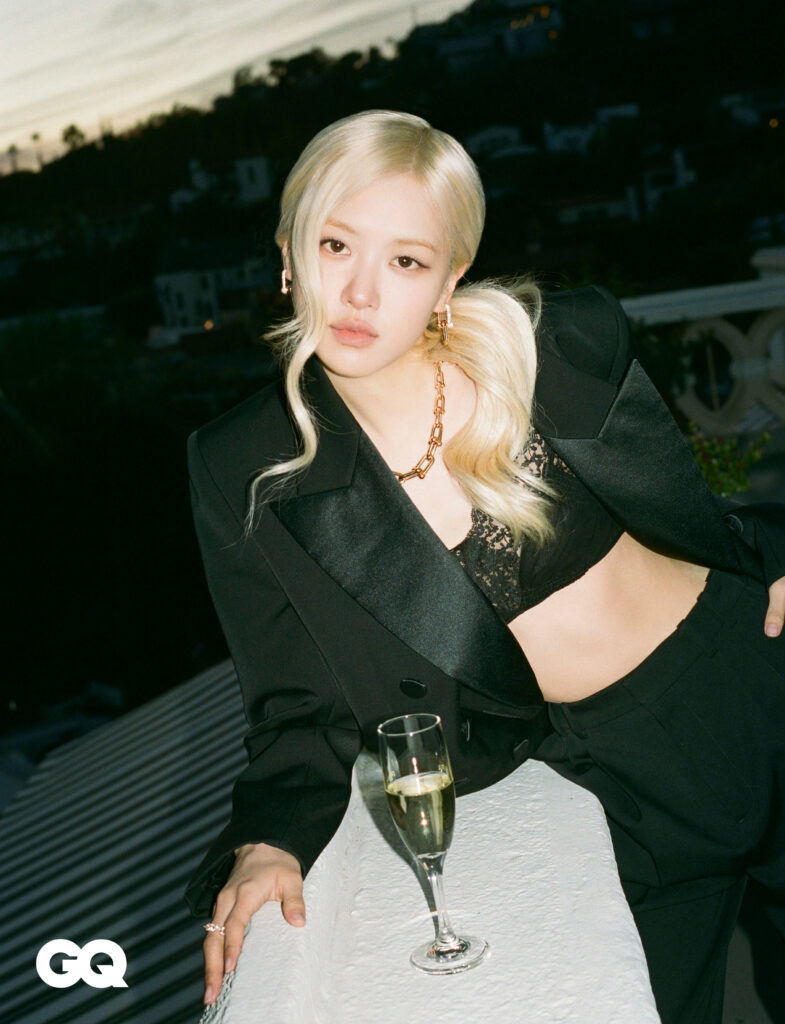
Her music reflects not only her own experiences, but also the emotions and stories she shares with those closest to her. Take Two Years, for example, inspired by a late-night heart-to-heart with a close friend. “That’s my favourite part of the whole album—it was like an unexpected gift,” she says softly. “That night, we opened up completely about life, laying bare our most fragile selves. Her story touched me deeply. Even though I hadn’t lived through the same thing, her resilience inspired me.” The next day, walking into the studio, that emotion still lingered. With a melody still missing, she completed the song in under four minutes. She sings the line quietly: ‘Maybe I’m just sick, and this is how it’s gonna be. Maybe this is all I know, and no, it’s not you, it’s me, ’cause it’s been two years.’ She recalls: “As we talked, emotions built up until we both started shouting, and I blurted out, ‘You know what? I’m done!’—and then we just laughed. Saying it out loud suddenly made it all feel lighter. Maybe things won’t get better, maybe there’s no one to blame, maybe it’s just me. It feels awful, but also strangely beautiful. That moment, both of us understood. That acceptance brought comfort.” She pauses. “Those lyrics are so powerful—they still move me every time I hear them.”
“Rosie is about embracing imperfections, acknowledging my way of thinking, and accepting the emotions I’ve been through. It’s not about proving strength, but rather saying: ‘I’m imperfect, and I accept myself that way.’” She explains: “Healing begins with acceptance—recognising your true feelings, no matter how embarrassing or shameful they might be. Once you accept them, you can fully show your truest self. Then art becomes the bridge that continues. When someone else understands your feelings, that resonance—that’s the most beautiful moment.”
Her album has struck that chord widely. Rosie debuted at No. 3 on the Billboard 200, the highest ranking ever for a Korean female soloist. Yet behind the glittering milestone, Rosé admits confidence is still a daily practice—a constant dialogue with herself. “People might think I radiate confidence, but really, I battle myself every day. Confidence isn’t a gift, it’s a reward for hard work. Every morning, I wake up with anxiety and doubt, but as the day goes on, I slowly rebuild that certainty bit by bit. It’s a process: working hard, overcoming doubt, recalibrating, trying again. Constantly refining my skills, checking and rechecking every detail, until I know I’ve given my all. When I know I’ve given 110%, that’s when confidence comes.”
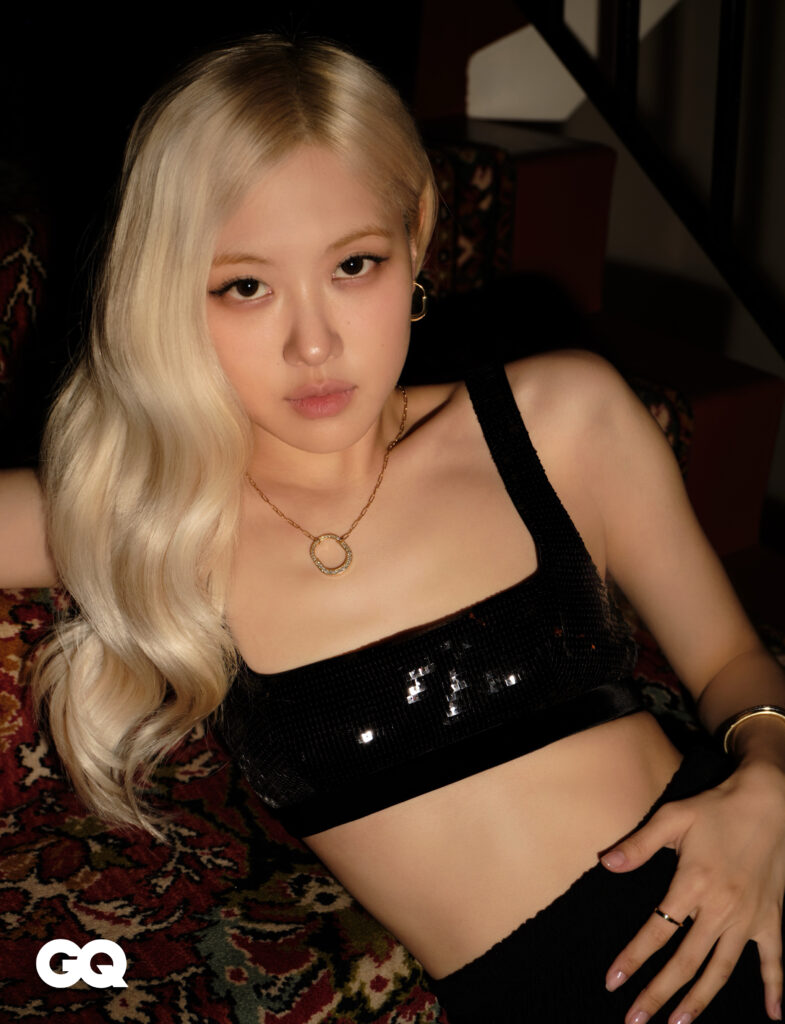
In her packed schedule, small joys keep her grounded. She suddenly picks up a box of macarons, grinning as she holds them to the camera. “I’ve learned to treat myself, usually with food, since I’m a total sweet tooth! Enjoying what you love, living in the moment.” Recently, she’s also fallen in love with cheese. “I never understood cheese before, but now I adore pairing it with fruit or crackers—it’s divine!” She laughs, recalling how she ropes her bandmates into tastings: “It’s like Ratatouille! I’m always pestering them—‘Try this! Taste that! It’s amazing!’”
Comfort doesn’t just come from food. She raises her hand to show her rings, glittering under the light. “I’m actually conservative with jewellery. I like wearing a few familiar, comfortable pieces. If something feels off or doesn’t match my outfit, I can’t focus. Once I find the right pieces, I rarely change them—they become part of me, like tattoos, until I find the next one.” She adjusts them again. “These two Tiffany & Co. rings—the Sixteen Stone and the Edge Bypass—have become part of me, like tattoos. I don’t even remember when I first put them on.” She laughs, explaining how they’ve accompanied her through both dazzling stage performances and quiet nights eating instant noodles. Of course, she switches it up occasionally: at Coachella, she stacked the bold Tiffany Titan by Pharrell Williams Five-row ring with a Tiffany T, turning jewellery into a key accent for the moment. After all, she’s been a Tiffany & Co. ambassador since 2021.
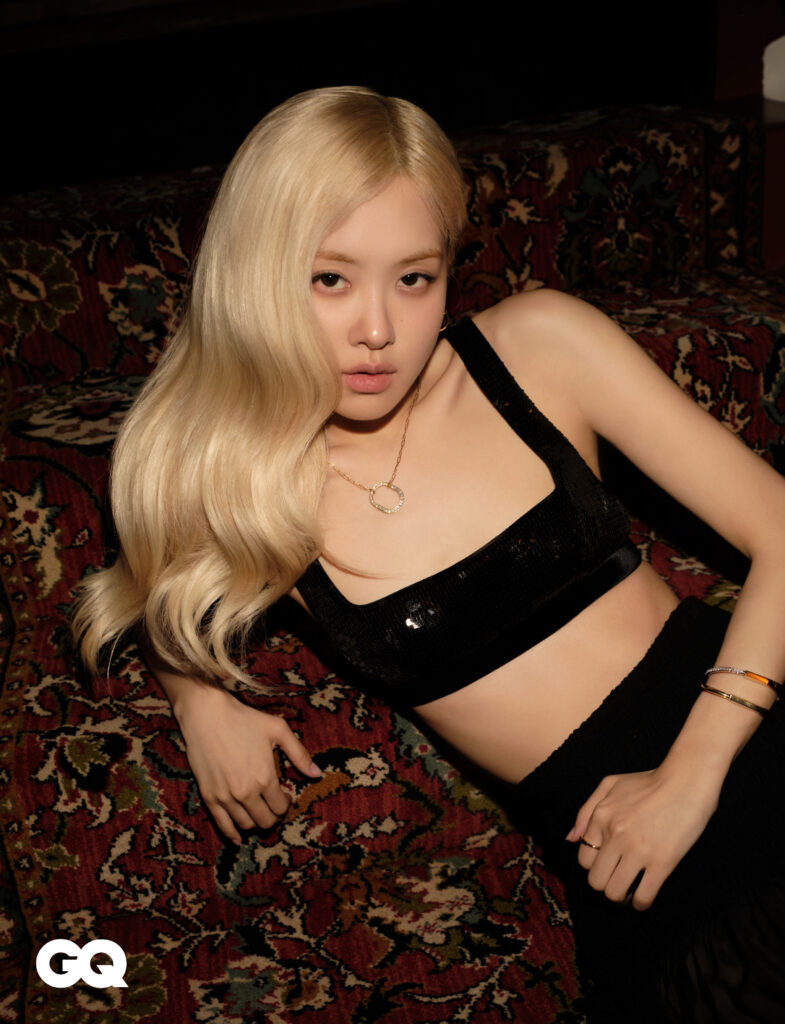
These rituals—savouring a macaron, pairing cheese just right, feeling the weight of familiar rings—are her anchors of gratitude amidst the whirlwind. They remind us that true beauty lies in life’s smallest details. If these precious fragments build Rosé’s world, then we’re fortunate to share a glimpse of it. Perhaps now is the perfect time to borrow Rosé’s lens, and reframe our own lives around those simple, happy moments that matter most.
Photography: Adrian Martin
Styling: Aeri Yun
Makeup Artist: Jungyo Won
Hair Stylist: Brandon Pietsch

